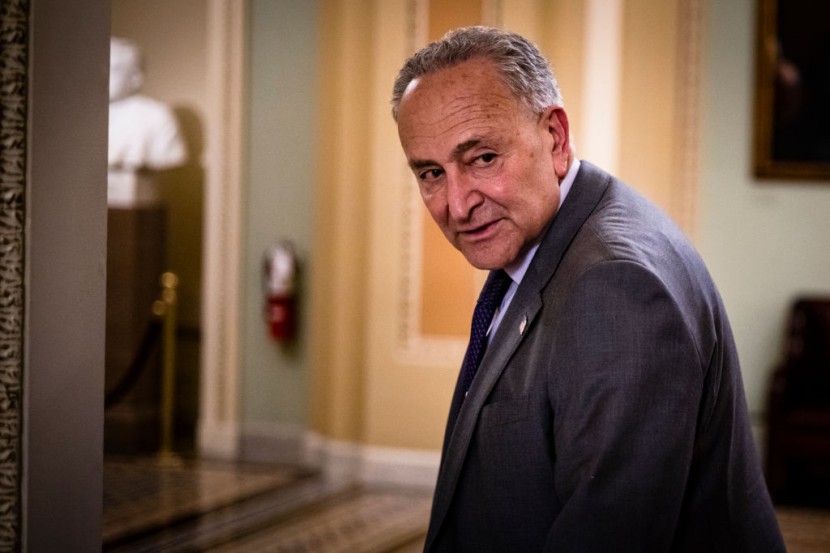
Senate Majority Leader Chuck Schumer (D-N.Y.) said Monday night that a test vote on the bipartisan infrastructure deal currently in the works will be held on Wednesday, nearly a month after a group of senators and President Joe Biden agreed on the concept.
Schumer's test vote is intended to put pressure on the ten Senate negotiators to finish their deal and to test the GOP negotiators' sincerity, especially after Republicans denied additional money for IRS tax-fraud enforcement, which is crucial part of the package's budget. Sen. Rob Portman (R-Ohio), the top Republican negotiator, claimed progress is being made and threatened to vote on Wednesday if the measure isn't on paper.
Bipartisan infrastructure plan
Senators' bipartisan infrastructure plan with President Joe Biden is in jeopardy ahead of a critical test vote on Wednesday, as they grapple with how to pay for almost $1 trillion in public works investment. Republicans were preparing to stage a filibuster against what they perceive as a hurried and flawed procedure on Tuesday, where discussions on the said matter raised tensions.
With Biden gearing up to travel the road to bolster support for his massive infrastructure ideas - which include $3.5 trillion in a follow-up package - dissatisfied Democrats say it's past time to at least start debating this first part of his plans. Six months after taking office, Biden's iconic campaign pledge to "Build Back Better" is being put to the test, putting the president and his aspirations for a new era of bipartisan collaboration in Washington to the test.
Since Sunday, White House aides and the bipartisan group of senators have been meeting privately to try to finalize the agreement, which would be the first phase of a $4 trillion-plus package of domestic outlays that would include child care, education, family tax breaks, and an expansion of Medicare for seniors. Biden said on Tuesday that Americans support his proposal overwhelmingly, and " that's the part that a lot of our friends on the other team kind of misses," Baltimore Sun reported.
For months, Congress has been debating a carefully drafted bipartisan infrastructure plan. The legislators who worked on the idea will meet again on Tuesday in the hopes of reaching an agreement on how to fund it, but Democrats are getting more frustrated with the process.
The bill's passage through the Senate may take up to two weeks. Meanwhile, with the annual August break approaching and a backlog of legislative work to do when they return to Washington in September, Democrats are in a hurry.
Republicans claim Schumer's move is risky
Republicans argue that Schumer's gamble is risky and may backfire, as per HuffPost. They claimed that senators should see the actual bill content before voting to begin the discussion on such a large package, particularly one that contains over $1 trillion in expenditures to improve the nation's infrastructure system.
In the Senate, voting to move a measure before the legislative language has been finished is not unusual. Senators did so earlier this year on anti-Asian hate crimes legislation and a spending package aimed at boosting competition with China, for example. In 2017, Republicans agreed to start debating measures to repeal the Affordable Care Act, despite not knowing what the final plan will look like, an effort that dramatically failed.
Another GOP negotiator, Alaska Senator Lisa Murkowski, has yet to indicate how she would vote on Wednesday. She noted, though, that if Schumer wanted the bill to pass, he would make sure that "people have an opportunity to look at what they might be voting on." Another negotiator, Sen. Mitt Romney (R-Utah), said he'd vote no if important elements of the package are still being worked on and they don't have a law in front of them.
Despite the protests of Portman and others against holding a vote on incomplete legislation, it's a tried and proven approach for both parties. Republicans began their effort to dismantle Obamacare with a vote on moving forward with an unwritten law; senators from both parties pushed hate crimes and competitiveness legislation before it was finalized this Congress.
Republicans, on the other hand, said there's no urgency to implement an agreement that Biden hailed beside five of them at the White House. Per Politico via Yahoo, Senate Minority Leader Mitch McConnell said that the Republicans "need to see the bill before voting to go to it. I think that's pretty easily understood."
Related Article: Joe Biden Slams GOP for Predicting Economic Chaos, Pushes for Further Spending
@YouTube
© 2025 HNGN, All rights reserved. Do not reproduce without permission.








